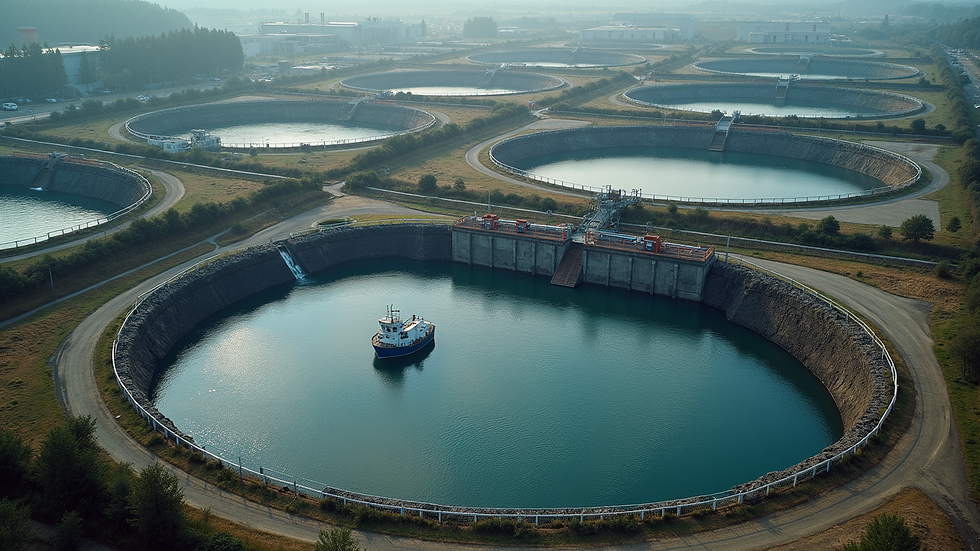Techniques for Effective Industrial Wastewater Management
- palwinder kaur
- Sep 3, 2025
- 3 min read
Industrial wastewater management is a critical aspect of sustainable industrial operations. Proper treatment and disposal of wastewater not only protect the environment but also ensure compliance with regulations and reduce operational costs. This article explores various effective wastewater techniques that industries can adopt to manage their wastewater efficiently.
Understanding Effective Wastewater Techniques
Effective wastewater techniques involve a combination of physical, chemical, and biological processes designed to treat wastewater before it is released into the environment or reused. These techniques aim to remove contaminants such as heavy metals, organic compounds, suspended solids, and pathogens.
Some common methods include:
Pre-treatment: Screening and sedimentation to remove large solids.
Primary treatment: Settling tanks to separate suspended solids.
Secondary treatment: Biological processes like activated sludge or biofilters to degrade organic matter.
Tertiary treatment: Advanced filtration, chemical treatment, or disinfection to remove remaining pollutants.
Each industry may require a tailored approach depending on the type and volume of wastewater generated.

What is Industrial Water Management?
Industrial water management refers to the strategies and practices used to optimize the use, treatment, and disposal of water within industrial processes. It encompasses water conservation, wastewater treatment, and reuse initiatives to minimize environmental impact and improve efficiency.
Key components of industrial water management include:
Water usage assessment: Measuring water consumption to identify reduction opportunities.
Wastewater characterization: Analyzing wastewater composition to select appropriate treatment methods.
Process optimization: Modifying industrial processes to reduce water use and pollutant generation.
Reuse and recycling: Treating wastewater to a quality suitable for reuse within the facility.
Implementing robust industrial water management practices helps industries comply with environmental regulations and supports sustainable development goals.

Advanced Techniques for Industrial Wastewater Treatment
Industries are increasingly adopting advanced technologies to enhance wastewater treatment efficiency. Some of these include:
Membrane Filtration
Membrane technologies such as ultrafiltration, nanofiltration, and reverse osmosis provide high-quality effluent by physically separating contaminants. These methods are effective in removing dissolved solids, bacteria, and viruses.
Chemical Precipitation
This technique involves adding chemicals to wastewater to convert dissolved pollutants into solid particles that can be easily removed. It is commonly used for heavy metal removal.
Biological Nutrient Removal
Advanced biological processes target the removal of nitrogen and phosphorus, which can cause eutrophication in water bodies. Techniques like nitrification-denitrification and enhanced biological phosphorus removal are widely used.
Electrocoagulation
Electrocoagulation uses electrical current to destabilize and aggregate contaminants, facilitating their removal. It is effective for treating oily wastewater and heavy metals.
Sludge Management
Proper handling and disposal of sludge generated during treatment are essential. Techniques such as anaerobic digestion can reduce sludge volume and produce biogas as a renewable energy source.

Practical Recommendations for Implementing Wastewater Techniques
To successfully implement effective wastewater techniques, industries should consider the following steps:
Conduct a thorough wastewater audit: Understand the volume and composition of wastewater generated.
Select appropriate treatment technologies: Choose methods based on wastewater characteristics and regulatory requirements.
Invest in skilled personnel and training: Ensure staff are knowledgeable about operation and maintenance of treatment systems.
Monitor and optimize processes: Use real-time monitoring to detect issues and improve efficiency.
Promote water reuse: Identify opportunities to recycle treated water within the facility.
Engage with experts: Collaborate with environmental consultants and technology providers for customized solutions.
By following these recommendations, industries can achieve sustainable wastewater management and reduce their environmental footprint.
Embracing Sustainable Industrial Wastewater Management
Sustainability in industrial operations is increasingly important. Adopting innovative and effective wastewater treatment techniques contributes to environmental protection and resource conservation. Industries can benefit from reduced water consumption, lower treatment costs, and improved compliance with environmental standards.
For industries looking to enhance their wastewater treatment processes, partnering with specialized providers in industrial wastewater management can offer tailored solutions that meet specific needs.
Implementing these techniques not only safeguards natural water resources but also supports long-term business viability in a world that values environmental responsibility.



Comments